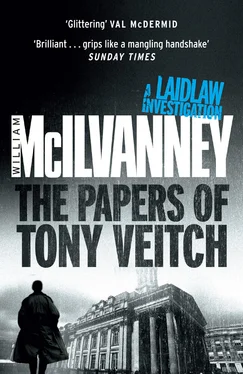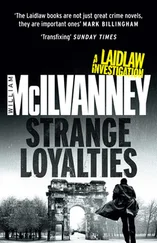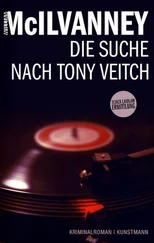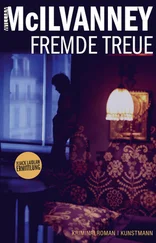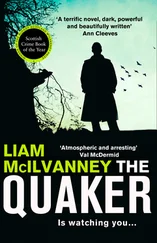William McIlvanney - The Papers of Tony Veitch
Здесь есть возможность читать онлайн «William McIlvanney - The Papers of Tony Veitch» весь текст электронной книги совершенно бесплатно (целиком полную версию без сокращений). В некоторых случаях можно слушать аудио, скачать через торрент в формате fb2 и присутствует краткое содержание. Год выпуска: 0101, Издательство: Canongate Books, Жанр: Полицейский детектив, на английском языке. Описание произведения, (предисловие) а так же отзывы посетителей доступны на портале библиотеки ЛибКат.
- Название:The Papers of Tony Veitch
- Автор:
- Издательство:Canongate Books
- Жанр:
- Год:0101
- ISBN:нет данных
- Рейтинг книги:3 / 5. Голосов: 1
-
Избранное:Добавить в избранное
- Отзывы:
-
Ваша оценка:
- 60
- 1
- 2
- 3
- 4
- 5
The Papers of Tony Veitch: краткое содержание, описание и аннотация
Предлагаем к чтению аннотацию, описание, краткое содержание или предисловие (зависит от того, что написал сам автор книги «The Papers of Tony Veitch»). Если вы не нашли необходимую информацию о книге — напишите в комментариях, мы постараемся отыскать её.
The Papers of Tony Veitch — читать онлайн бесплатно полную книгу (весь текст) целиком
Ниже представлен текст книги, разбитый по страницам. Система сохранения места последней прочитанной страницы, позволяет с удобством читать онлайн бесплатно книгу «The Papers of Tony Veitch», без необходимости каждый раз заново искать на чём Вы остановились. Поставьте закладку, и сможете в любой момент перейти на страницу, на которой закончили чтение.
Интервал:
Закладка:
Mickey looked at Hook, who put the question back to John Rhodes. John nodded.
‘Okay. He’ll help. But don’t come back to any o’ ma pubs, Cam. And you, Action Man.’ He pointed at Panda Paterson. ‘If it even rains on any o’ ma pubs, Ah’m gonny blame you. See it disny. Macey here’ll pass on anything else we get. Okay?’
‘Okay. The fella’s name is Tony Veitch. I’ll be looking for you soon, Macey.’
Macey nodded briskly to cover his worry. In a marriage as uneasy as this one the best man could finish up being the purvey.
12
This should have been a Saturday but it didn’t feel like one to Harkness. This had to be the eighth day of some deformed week, a kind of thirty-first of June. It didn’t fit. Maybe the moon had blown a fuse.
They weren’t in the office. They weren’t preparing for a court case. They weren’t on surveillance. They weren’t on the streets soliciting information. They were in Pollokshields.
It was a part of Glasgow Harkness didn’t know too well, a place on the South Side to drive through sometimes on his way to work, trying not to let the houses bother him. All fur coats and no knickers, he had often told himself as an antidote to the envy that hit him here like lack of oxygen.
But it wasn’t true. The wealth was more real than apparent. Some of the huge yellow sandstone houses had been converted into flats, it was true. A few had become self-contained Pakistani villages. But the infiltration of some of the merely well off or even the poor was hardly enough to change the basic impression this part of Pollokshields gave.
The house they were visiting confirmed it. It was a turreted sandstone castle separated from the street by a low wall and a high hedge, like a soft-sell moat. The conservatory at the side was an interesting piece of architecture in itself, a domed colony of humid vegetation. Inside the house, Harkness had half-expected to be handed a catalogue. The wide hall had two abstract paintings and a small terracotta frieze set into the wall — some ancient punters naked among the leaves. The staircase looked a suitable place for losing a glass slipper. A stained-glass window guled the fawn carpet faintly.
The room they had been shown into was furnished richly in leather and wood, nothing more parvenu being permitted. There was so much space around that the armchairs they sat in felt to Harkness like stations on a steppe. Watching their host nursing a nugget of Chivas Regal in his hand, Harkness wondered why Laidlaw hadn’t taken one, obliging him to abstain as well. It wasn’t as if Laidlaw had never indulged on duty before.
Milton Anthony Veitch, as he had declared himself, was wearing his late forties as if anything else was merely apprenticeship. The hair was beautifully grey, fairly long and precisely cut, looking not just washed but professionally laundered. The slightly worn face was carried proudly, like a trophy. The lines were earned. As far as women went, Harkness imagined, he was still a runner. If any lady didn’t fancy him, that was her problem.
He was a big man but had stayed nearly trim. The weight was only now beginning to hang like slightly inferior tailoring. The way he was sitting in his real leather chair, the stomach bulged delicately. But that was a tasteful cairn, memorial to good times. Maybe he couldn’t make it happen everywhere any more, Harkness thought, but then he wouldn’t have to. Money would allow him to move through invented habitats and there he must still be special, an aging lion at Longleat. Harkness thought he wouldn’t like to be looking at his host down the wrong end of a business decision.
Milton Veitch had listened to Laidlaw explaining about Eck, Eck’s piece of paper, and his address on it. He sighed.
‘You have the piece of paper with you, do you?’
Laidlaw took it out, went over and gave it to Mr Veitch, came back and sat down. The time it took in this room, Harkness thought, a bus-service would have helped. Mr Veitch watched his drink, looked up.
‘Tony,’ he said.
‘Tony?’
‘My son. He wrote that.’
‘You’re sure, Mr Veitch?’
He smiled.
‘I think I would know his writing. Besides, I was privileged to receive a communication recently from him myself. A letter, in a manner of speaking. That script is very fresh in my mind.’
He rose and crossed to the door and called, ‘Alma.’ The woman who appeared, like most women, interested Harkness. He felt that this time Laidlaw, who said that studying good-looking women was one of the non-taxable perks of the job for Harkness, must be agreeing. She was tall, maybe late thirties. She clarified for Harkness why it was that older women interested him so much. It was very simple: she had been where he hadn’t been but where he wanted to go. As soon as he saw her, he saw a doorway he wanted to go through.
‘This is Miss Brown,’ Milton Veitch said to them, which was like pointing to Rheims Cathedral and saying, ‘This is a church.’
She smiled and Harkness’s head turned a somersault. It was a beautiful smile, slow and undeliberate and unselfconsciously strange. Harkness decided it was an Amazon of a smile and he knew what he wanted to be: an explorer.
‘She keeps house for me.’
Everybody in the room knew what he meant and Harkness was deeply disappointed. She could be so much more than that, he knew. He started to have misgivings about her.
‘Alma. Do we still have that letter Tony wrote me?’
‘Which letter?’
His look told her not to play games.
‘Which letter would it be?’
‘You threw it out. Remember?’
‘Anyway, it doesn’t matter. It was just to convince the police force that I know my own son’s writing. Maybe you’d better stay.’
He did the introductions and they all sat down again.
‘What was the letter about?’ Laidlaw asked.
‘A good question. A tantrum against fatherhood is about as near as I could get.’
‘Your son doesn’t live here?’
‘Not for a while, no. In fact, we don’t know where he lives at all.’
‘That’s only been for a week or more,’ Alma said. ‘Give him time.’
‘I’ve got no more time to give him,’ Mr Veitch said. ‘Not another day.’
They were looking at each other, the absent Tony forming a frost between them.
‘Does the letter have something to do with that?’ Laidlaw asked.
Mr Veitch noticed him again. He sighed.
‘It’s a long and largely unsavoury story. My son is a student at Glasgow University. Was. He was sitting his final exams recently and disappeared before he had taken all the papers. The letter was written to explain — I use the term loosely — his behaviour to me. Not so much a letter, really. More like a novel by post.’
‘But before that he hadn’t lived here anyway?’
‘In a flat in the city. The wild freedom of youth, I suppose. But since he left there we haven’t a clue where he is.’
‘You haven’t tried to trace him?’
‘Well, he’s patently all right. His letter was nothing if not full of the vigour of condemnation. I think he has at last found a way of expressing his rejection of everything I stand for. He’s been trying to get the message through to me for long enough. I deliberately didn’t contact the police. If he wants to disown me, that’s his right. He is over twenty-one. Just. Perhaps you could let Alma see your piece of paper? A corroborative witness, do you call it?’
Alma didn’t linger over reading it. Milton Veitch was watching her closely but she didn’t look at him.
‘It’s Tony’s writing, all right,’ she said.
‘The man who had it on him was a vagrant. Eck Adamson. He’s dead. Paraquat poisoning.’
‘Suspected,’ Harkness said.
Читать дальшеИнтервал:
Закладка:
Похожие книги на «The Papers of Tony Veitch»
Представляем Вашему вниманию похожие книги на «The Papers of Tony Veitch» списком для выбора. Мы отобрали схожую по названию и смыслу литературу в надежде предоставить читателям больше вариантов отыскать новые, интересные, ещё непрочитанные произведения.
Обсуждение, отзывы о книге «The Papers of Tony Veitch» и просто собственные мнения читателей. Оставьте ваши комментарии, напишите, что Вы думаете о произведении, его смысле или главных героях. Укажите что конкретно понравилось, а что нет, и почему Вы так считаете.
